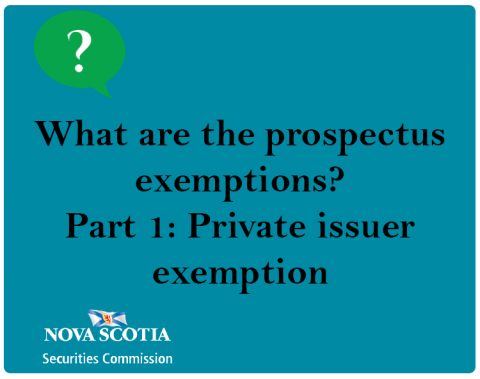Submitted by nsscadmin on

The Nova Scotia Securities Commission routinely tells investors if someone is offering securities as an investment to raise capital, they must provide them with a copy of a disclosure document called a prospectus, unless an exemption applies. But how can an investor know if a prospectus exemption applies without first knowing what these exemptions include? We hope to shine a light on some of these exemptions over our next few blog posts.
Over the next six weeks we’ll go through the most common prospectus exemptions.
- Private issuer exemption
- Family, friends, and business associate’s exemption
- Employee, director, officer and consultant exemption
- Accredited investor exemption
- Minimum amount ($150,000) exemption
- Start-up crowdfunding exemption
- Offering memorandum exemption
Today we’ll start with the private issuer exemption.
After creating a company, limited partnership, trust, or co-operative association you may need more funding to continue operating your business. By relying on the private issuer exemption, you can sell securities without making any disclosure as long as the trades are to any of the following:
- Directors, officers, employees or control person of the issuer
- Family members of the directors, senior officers or control persons
- Close personal friends or close business associates of the directors, senior officials or control persons
- Current security holders
- Family members of a selling security holder
- Accredited investors.
You do not need to report the use of the private issuer exemption to the Commission, but you should keep a detailed record of everyone that has purchased securities and document how the private issuer exemption applies to the securities you sold.
The issuer also must fit the requirements to be a private issuer. This means they:
- are not a reporting issuer, mutual fund or pooled fund;
- have less than 50 security holders, excluding employees and former employees;
- have restrictions on the transfer of securities in its articles, memorandum, bylaws, or shareholder agreements; and
- have sold its securities only to persons that fit the private issuer requirements (listed above)
This series will focus only on the prospectus exemptions. However, there may be requirements to be registered depending on the nature of the trading activity. You should review the registration requirements for further information and consult with legal counsel about the registration requirements.
You should consult with legal counsel familiar with securities laws if you have any questions about the prospectus exemptions and how to comply with the requirements to rely on the prospectus exemption.
